NACo Commission on Mental Health and Wellbeing: Reimagining the Advancement of Mental Health Support Through Policy Reform

Author

Blaire Bryant

Brett Mattson

Naomi Freel
Upcoming Events
Related News
The mental health crisis in America is a dire situation that demands urgent attention. It is a crisis of:
- Suffering, where over 50 million people are burdened with the weight of mental illness in any given yeari, over 100,000 people died of a drug overdose in 2021ii, and suicide is now the leading cause of death in youth and young adults age 10-24iii
- Workforce shortages, where the supply of trained behavioral health workers is outpaced by the demand for these critical services
- Systemic failure, where our archaic policies and fractured intergovernmental framework have failed to address the root causes of mental illness and instead have perpetuated a cycle of poor outcomes, backlogs and delayed care
- Inequity, where despite the fact that mental illness in America transcends age and race barriers, some Americans are too often left without access to the care they need
A nationwide crisis demands an intergovernmental solution. Counties are ready to work across public private and non-profit sectors to blunt this growing crisis through specific federal policy, cross-sector collaboration and enforcement of mental health parity.
Introduction
The mental health crisis in America is a dire situation that demands urgent attention. It is a crisis of:
- Suffering, where over 50 million people are burdened with the weight of mental illness in any given yeari, over 100,000 people died of a drug overdose in 2021ii, and suicide is now the leading cause of death in youth and young adults age 10-24iii
- Workforce shortages, where the supply of trained behavioral health workers is outpaced by the demand for these critical services
- Systemic failure, where our archaic policies and fractured intergovernmental framework have failed to address the root causes of mental illness and instead have perpetuated a cycle of poor outcomes, backlogs and delayed care
- Inequity, where despite the fact that mental illness in America transcends age and race barriers, some Americans are too often left without access to the care they need
A nationwide crisis demands an intergovernmental solution. Counties are ready to work across public private and non-profit sectors to blunt this growing crisis through specific federal policy, cross-sector collaboration and enforcement of mental health parity.
1. Amend Exclusionary Policies Under Medicaid
ISSUE
The Medicaid Inmate Exclusion Policy (MIEP) is a federal policy outlined under Section 1905(a)(A) of the Social Security Act that revokes federal health benefits for adults and juveniles housed in correctional institutions - making no distinction between individuals who are being detained in jails prior to due process, versus individuals who have been adjudicated and sentenced to time in a jail or prison. Without revision, this policy creates inequitable and unconstitutional disruptions to primary and behavioral health care services for justice-involved populations, thus exacerbating rates of untreated mental illness and substance use disorder in local communities and increasing rates of avoidable, costly jail recidivism.
POLICY SOLUTIONS
- Clarify federal policy through the removal of limitations under Medicaid, Medicare, CHIP and the Department of Veterans Affairs on benefits for persons in custody pending disposition of charges.
- Expand the approval of federal and state regulatory measures that would allow Medicaid payment for medical services furnished to any eligible incarcerated individual during the period that proceeds the individual’s release.
- Advance federal policy that would allow Medicaid payment for medical services furnished to any eligible incarcerated individual during at least the 30-day period preceding the individual’s release.
SOLUTION
Amend the Medicaid Inmate Exclusion Policy (MIEP) for improved care continuity of individuals living with mental illness and/or substance use disorder. Amending the MIEP to allow individuals who are detained pre-trial to retain access to Medicaid and other federal health benefits will help break the cycle of recidivism exacerbated by untreated physical and mental illnesses and substance use disorders as it is estimated that 44 percent of those in jail have a mental illness and 63 percent have a substance use disorder.iv

ISSUE
Federal restrictions on Medicaid reimbursement for inpatient care have created significant barriers to providing clinically necessary inpatient mental health services and contributed to inequities in access to treatment and care for low-income individuals.
POLICY SOLUTIONS
- Expand the approval of regulatory measures that waive IMD restrictions for adults with serious mental illness (SMI), children with serious emotional disturbance (SED) and short-term residential stays for the treatment of substance use disorder (SUD).
- Advance regulatory or legislative policy that waives and modernizes IMD restrictions for short-term crisis stabilization facilities, as a critical component of the crisis care continuum.
SOLUTION
Modernize the Institutions for Mental Diseases (IMD) exclusion to reduce barriers to the provision of comprehensive behavioral health treatment and increase access to short-term residential treatment when clinically appropriate. The federal Medicaid statute prohibits federal reimbursement for care provided in psychiatric or other residential treatment facilities with more than 16 beds, defined as Institutions for Mental Diseases (IMDs). Modernizing the Medicaid IMD exclusion would greatly expand the treatment capacity of county-operated hospitals and behavioral health facilities while also promoting equitable access to treatment options for our most vulnerable residents.
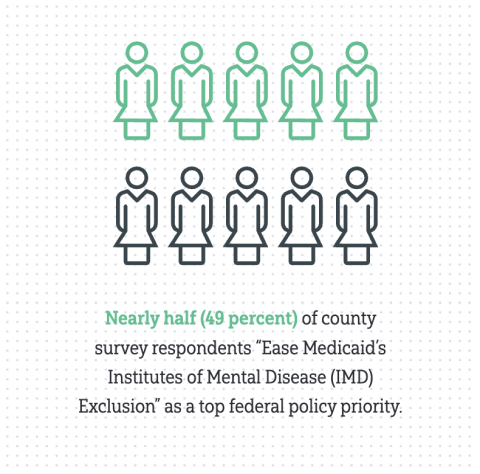
2. Strengthen the Mental Health Workforce
ISSUE
Counties across the nation are investing in programs and initiatives that both assist with and incentivize the recruitment, training and placement of behavioral health providers that will work within local and under resourced communities. However, despite those efforts, half of the U.S. population reside in counties that have been designated as mental health professional shortage areas.
POLICY SOLUTIONS
- Advance federal policy that takes a comprehensive approach (e.g. loan forgiveness programs, streamlining licensure/credentialing processes, tax incentives, etc.) that creates clear entry pathways for behavioral health professions, particularly in rural and underserved areas.
- Enhance funding authorizations for existing programs, such as the National Health Service Corps, that promote workforce recruitment and retention in local areas.
SOLUTION
Obtain direct and flexible resources and incentives to support the recruitment, training and retention of a sufficient behavioral health workforce. Counties rely on our federal partners to supplement investments made in the mental health workforce through the enhancement of existing programs that promote workforce recruitment and retention. New financial incentives for integrated care may result in an increase of individuals taking jobs in the behavioral health care field and increase access to these critical services.
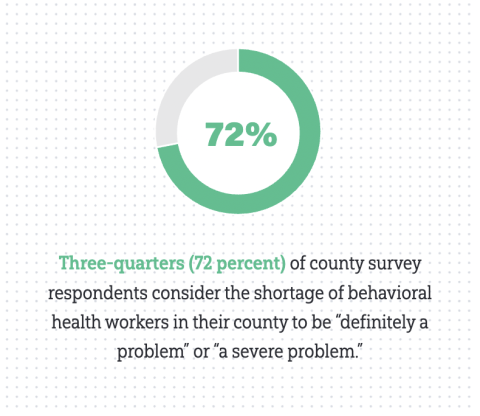
3. Invest In and Align Local Crisis Response Systems
ISSUE
Our nation’s lack of an effective and widely available mental and behavioral health crisis services system has contributed to tragic outcomes for people in crisis. The absence of local crisis systems has negative impact on residents and results in higher costs for the public sector and taxpayers. Although the prevalence of serious mental illness in the general population is approximately 5 percent, data indicates that 26 percent of people in jails have a serious mental illness, and most were incarcerated due to non-violent offenses.v
POLICY SOLUTIONS
- Increase federal coordination on resources and technical assistance to local governments on the development of crisis call centers.
- Enhance funding for existing programs that aid in the development, expansion and sustainment of crisis response infrastructures.
- Expand state and federal support for the expansion of evidence-based crisis response models, including Crisis Intervention Team (CIT) programs and Crisis Assistance Helping Out On The Streets (CAHOOTS).
- Authorize the use of Medicaid financing for regional and local crisis call center operations, crisis stabilization facilities and integrated primary, mental health and crisis response care models such as Community Behavioral Health Centers (CCBHC).
SOLUTION
Enhance the intergovernmental partnership for the development and modernization of local crisis response systems and infrastructure. Counties are working to develop and support new models of servicing individuals in crisis that are tailored to fit the unique needs of our communities which include the development of tiered and co-response models, integrative care, wraparound service and referral systems and 24/7 call centers that support the recently implemented 988 National Suicide Prevention Lifeline. The long-term success of these efforts is dependent on a strong intergovernmental partnership, where all levels of government are invested in aligning systems for better outcomes for individuals in crisis.
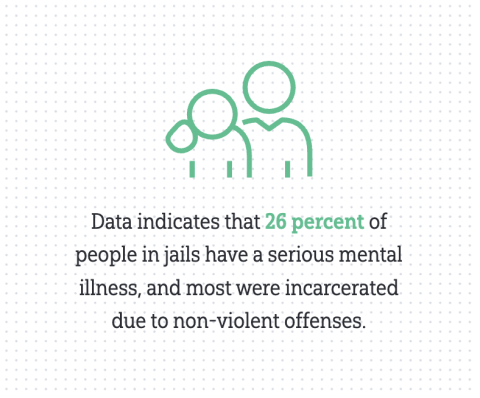
4. Enforce Mental Health Parity
ISSUE
Despite legislative advancements over the last decade, there are still significant disparities in the coverage of mental health and substance use disorders under both public and private health insurance plans, when compared with coverage for medical and surgical benefits. Furthermore, while Medicaid and Managed Care Plans (MCOs) must follow federal parity laws, Medicaid fee-for-service plans do not, which inhibits many individuals from accessing potentially lifesaving coverage.
POLICY SOLUTIONS
- Advance federal and state-level legislation that incentivizes and enforces existing parity policy and ensures that laws are uniformly implemented across both public and private insurers providers, and in all 50 states and the District of Columbia.
SOLUTION
Enforce policies that ensure equal coverage of treatment for mental illness and addiction. The Mental Health Parity and Addiction Equity Act (P.L. 110-343) is a federal parity law that was enacted in 2008, and required comprehensive standards for equitable coverage of mental health and substance use disorder treatment and coverage of physical treatment. Strengthening behavioral health parity protections and enforcing existing protections is a critical component of improving coordination and integration of primary care and behavioral health care in the health care delivery system, and better addressing the behavioral and mental health needs of our community more broadly.
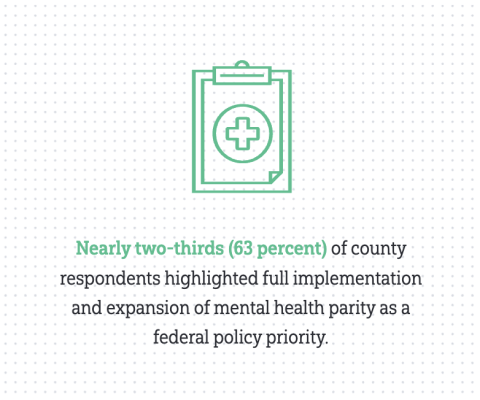
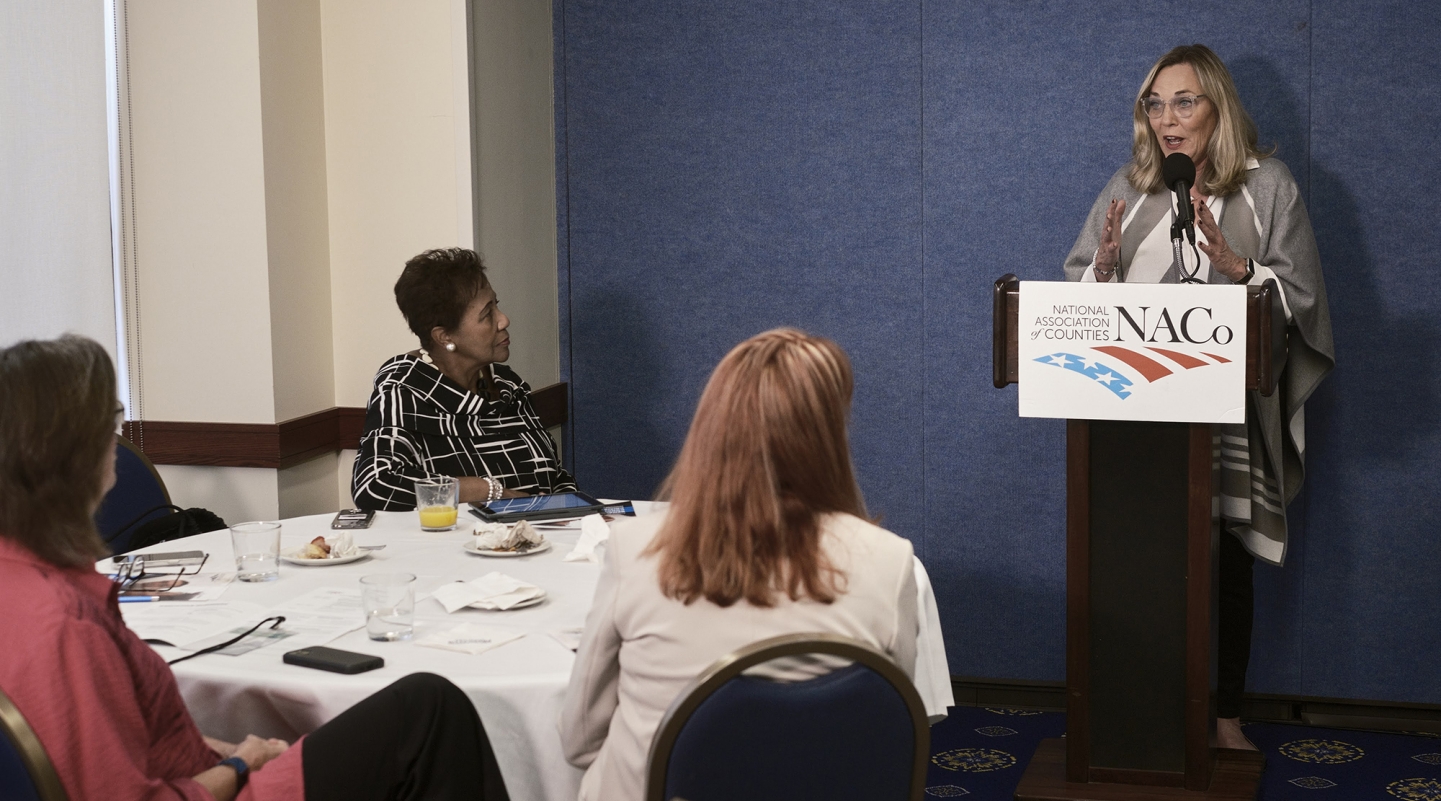
About NACo's Commission on Mental Health and Wellbeing
Launched in February 2023, the NACo Commission on Mental Health and Wellbeing brings together county leaders from across the nation to take action to address the ever-growing mental health crisis from the county government perspective. Through this commission, NACo will elevate the critical role that counties play in providing high quality, accessible mental health services, showcase county innovations and solutions and outline the intergovernmental and public-private partnerships required to reimagine and strengthen our nation’s mental health policies, programs and practices.
Contacts

Blaire Bryant

Brett Mattson

Naomi Freel
References
[i] https://www.samhsa.gov/data/sites/default/files/reports/rpt39443/2021NSDUHFFRRev010323.pdf
[ii] https://www.kff.org/coronavirus-covid-19/issue-brief/the-implications-of-covid-19-for-mental-health-and-substance-use/
[iii] https://www.pewtrusts.org/en/research-and-analysis/articles/2023/03/03/youth-suicide-risk-increased-over-past-decade#:~:text=This%20finding%20is%20consistent%20with,make%20suicide%20plans%20and%20attempts
[iv] https://www.samhsa.gov/criminal-juvenile-justice/about#:~:text=It%20is%20estimated%20that%2018,have%20a%20substance%20use%20disorder
[v] https://www.brookings.edu/blog/usc-brookings-schaeffer-on-health-policy/2022/01/06/building-a-sustainable-behavioral-health-crisis-continuum/
Related News

White House Executive Order establishes national substance use disorder response
On January 29, the White House issued an Executive Order (EO) establishing the Great American Recovery Initiative, a new federal effort aimed at coordinating a national response to substance use disorder (SUD).

SAMHSA cancels, reinstates thousands of behavioral health grants
Late on Wednesday, January 14, the Administration announced that thousands of Substance Abuse and Mental Health Services Administration (SAMHSA) grants that had been terminated just one day earlier would be reinstated.

CMS requires state Medicaid suspension upon arrest versus termination
Effective January 1, 2026, federal law now requires states to suspend, rather than terminate, Medicaid coverage when an individual is incarcerated.